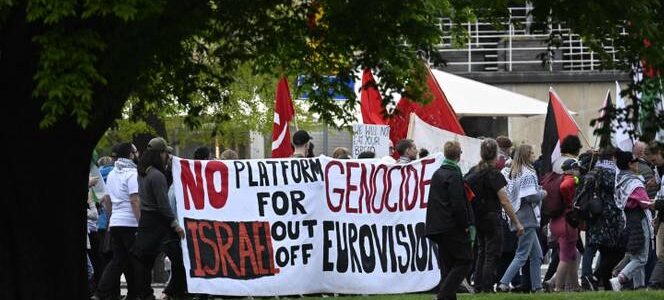by Geoff Vasil
Opaque participation rules, a system of internal patronage, sad attempts at bad pop music and a voting system which emulates the worst Third World satrapy. Yet, the Eurovision Song Contest has a cult following in Europe, and has had for many decades. In practice this race to the bottom of pop culture has led to performers intentionally playing to the lowest common pop-denominator, making themselves and the contest into a complete caricature, or a caricature-within-a-caricature, if you like.
Besides the byzantine voting process, “reformed” in recent years for a proportional voting system where unelected local/national juries or commissions account for perhaps (no one really knows) half of the total vote, while nation-state-member audiences call in their votes amounting to perhaps half the total, no one has really defined what “European” means in terms of this odd competition. Earlier contestants included Morocco and Lebanon, Australia seems to have secured a permanent vote, and Israel has been an on-again, off-again participant and voting block.
This year around 20,000 protestors descended on Malmo in Sweden–Sweden is the venue because their team, band, or horde, won last year–to demand Israel be excluded.
In semi-finals whoever actually runs the Eurovision Song Contest demanded the Israeli group rename their entry from “October Rain” to something else, which became “Hurricane,” although the actual message of the song seems to revolve around Hamas’s unprecedented atrocities against Israeli civilians on October 7, 2023.
Beyond the protests outside in Sweden’s second city rocked by immigrant violence, rape and bombings in recent decades, which included former child purveyor of climate-change fear-porn Greta Thunberg waving the Palestinian flag in a veritable Children’s Crusade of Swedish toddlers, there was visible opposition to Israel’s participation within the venue during the semi-finals and final competition. Large portions of the crowd booed the Israeli performers, and at the finals they booed every country which gave votes to the Israeli act.
Behind the scenes there were also intrigues. The Dutch competition with his “Europapa” was excluded from rehearsal for the finals because of an alleged “incident” involving his exchange with a photographer. The Irish entry, in the person of one Barbie Thug, said she cried when she heard Israel was “being allowed” to take part. The Hamas supporters inside and outside the venue claimed the Eurovision Song Contest leadership–shadowy and slippery figures at best–had some sort of duty to exclude Israel, citing the precedent of the political decision to exclude Russia when Eurovision took sides in the Russian-Ukrainian conflict a few years back.
Last year’s winner Loreen said she would refuse to hand the glass prize trophy to Israel if they won.
Israeli prime minister Binyamin Netanyahu commented on the event before the finals, saying the Israeli band had already won just by appearing on stage in Malmo.
In the end the unelected national juries gave almost no points to Israel, with the exception of Norway and a few others, but the voting by audiences from the participating countries put Israel in the top five. In the end the juries and audiences decided Switzerland’s entry Nemo was the best, a song called “The Code” about one person’s journey to a transgender or genderless (same thing) future:
“Somewhere between the 0s and 1s [cis-binary cis-Alpine gender concepts]
“That’s where I found my Kingdom Come…
“I broke the [DNA-determinant gender] code…”
Whatever pressure was exerted, and it seems to have been great, the gray shadowy leaders of Eurovision Song Contest didn’t exclude Israel, even if they censored the national entry, and accepted the European public’s vote, placing Israel somewhere near 5th place, around what Ireland’s Bambie Thug with her Doomsday Blue music video based on ritual magic or pop Satanism earned, although they were an early favorite to win.
The opinions expressed here are solely those of the author and do not reflect any position, official or otherwise, of the Lithuanian Jewish Community.


